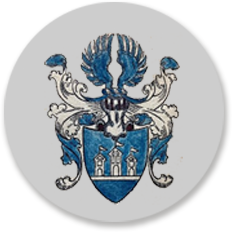The origin
Valenciennes / Hubert Herstatt (1596-1678)
The ancestor of all Herstatts is Hubert Herstatt (1596-1678). He was born in Bilstein, a municipality in the Belgian province of Liège. His parents came from Valenciennes, a town in the north of France. When the Reformed no longer felt safe in France, the Herstatt family moved to neighbouring Liège.
Aachen, Stollberg, Eschweiler and Düren
Members of the family settled in Aachen, Stollberg, Eschweiler and Düren. Hubert Herstatt found his longed-for rest in Eschweiler after the persecution, worked as a “fabriquant” and lived there with his wife Maria née Remeys from Aachen (1609-1678) and his many children until the end of his life. One of his sons, Isaak Herstatt (1657-1737), married to Mintha Johae was the progenitor of today’s descendants.
Cologne
His son Isaak Herstatt (1697-1761), married to Gertrud Lomberg, was the first head of the family to move to Cologne around 1700. The couple had several children. Two sons should be mentioned here, Johann David Herstatt (1740-1809) and Johann Jakob (1743-1811), as they had descendants for many generations and the respective first names (David and Jakob) were passed on again and again to the next descendant.
Textile production and trade
The Eschweiler families Hubert and Isaak Herstatt were professionally involved in the production and trade of textiles, were highly respected citizens of the town and very involved in the church community through office and generous donations. The two brothers Johann David and Johann Jakob Herstatt took over their parents’ business and developed it into an “industrial” enterprise by the standards of the time. They produced so-called silk and pile ribbons on more than 200 looms and sold them at home and abroad. These ribbons were used to a large extent for military uniforms. Despite their great success, the Herstatt brothers were very restricted in their actions as Protestants in Catholic Cologne with its powerful guilds and restrictive rules concerning the practice of their profession and the acquisition of property.
The French Occupation (1794-1815)
This was only to change during the French occupation (1794-1815). The changes brought about by the French influenced the existing business, but also forced a rethink. The Code Civil or Code Napoléon brought freedoms in the occupied Rhineland, and thus also in Cologne, in the area of business practice and legal security, which greatly promoted the professional opportunities of the Herstatt family. Friedrich Heinrich Herstatt (1771-1816), son of Johann Jakob Herstatt, was even able to become mayor of Cologne (1801 and 1803) as a Protestant.
However, the Herstatt brothers’ silk business was also considerably weakened by the blockade of England / Continental Blockade initiated by Napoleon. Exports to England, which were considerable for the Herstatt brothers, collapsed, high customs duties reduced the returns and the brothers concentrated more and more on new areas of business. The production of silk and foil ribbons was gradually reduced and finally stopped in 1815.
